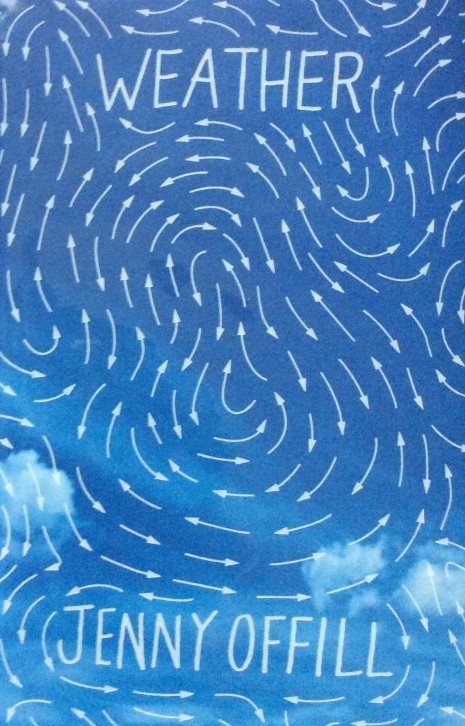Inspiring Older Readers
 posted on 10 Aug 2021
posted on 10 Aug 2021
Weather by Jenny Offill
There was a lot of praise in the world of literary criticism for Jenny Offill’s 2014 novel, The Dept. of Speculation which I kept meaning to buy but somehow never got around to. So when I saw her most recent book, Weather on the shelves of my local bookshop I thought it might be worth giving it a try.
It turns out to have been a fortunate bit of happenstance because this is a book with a central character/narrator who stays in the back of your mind well after you’ve finished reading what is little more than a long novella.
Lizzie Benson is our guide to life in the nightmare that the USA was slipping into as it came to the realisation that Donald Trump had been elected as President and the crazy world of conspiracy theorists and social media doom-mongers seemed to be redrawing the rules of social engagement. Lizzie is a librarian in New York who is married to Ben and has a young child, Eli. Lizzie finds herself playing the amateur psychiatrist to a range of eccentrics and inadequates who frequent the library and has an oddly protective relationship with Mr Jimmy, her mini-cab driver.
Lizzie’s life would perhaps be hectic but unexceptional if it wasn’t for the fact that she also has to deal with a fundamentalist Christian mother via a relationship conducted mainly by telephone and a brother who has been a long time abuser of prescription drugs.
But she is plunged into the maelstrom of the modern world of social media mania when her mentor and old college teacher, Sylvia asks her to become her personal assistant and take on responsibility for answering the emails generated by her podcast, ‘Hell and Highwater’. It’s a sobering proposition because, as Lizzie herself notes:
“Everyone who writes to her is either crazy or depressed”
As Lizzie’s world view gets increasingly wrapped up with the survivalists and disaster narratives of the e-mailers she also has to deal with her brother who is going to pieces as his relationship falls apart after the birth of his child. Eventually her brother moves in to live with Lizzie and Ben and Eli feel so invaded by this that they are forced to go off on an extended trip.
On a night out drinking at a bar she once frequented when she was single she meets and flirts with a journalist who spends his life in war zones and it is in discussion with him that the book’s key lines are spoken:
“Does this country feel like it’s at peace or war?” she asks him. “He says it feels the way it does just before it starts. It’s a weird thing, but you learn to pick up on it. Even while everybody’s convincing themselves it’s going to be okay, it’s there in the air somehow.”
The title of the book, Weather is a reference to the ecological crisis that preoccupies many of those emailing Lizzie following one of Sylvia’s podcasts but it is also, of course, a reference to the prevailing atmosphere enveloping America. As one of Lizzie’s Iranian friends tells her, the election of Trump is an indication:
“Your people have finally fallen into history,”
One of the most challenging and remarkable things about the book is that Offill has virtually abandoned the traditional narrative arc in favour of a fragmented internal monologue. This isn’t a stream of consciousness technique but a story presented in what I can best describe as ‘thought bubbles’ – islands of ideas and descriptions that when seen from the readers perspective are stopping points or stepping stones on a bigger sea of story.
Alex Preston reviewing the book in The Guardian summarises this excellently:
“…the paragraphs in Weather are each a kind of koan, some short, some long, all of them containing a piece of central, organising wisdom. Penelope Fitzgerald was the queen of the innocuously devastating aphorism; Offill has inherited her crown. Again and again her sentences resonate powerfully, drawing you in with their humour before sideswiping you with their veracity. At one point Lizzie tells us that she’s “always had an obsession with lost books, all the ones half written or recovered in pieces”. She doesn’t say why, but I think it’s because these “half-written” books require the participation of the reader to complete their story. In Weather, we construct a whole from the pieces Offill gives us, and find that we hold in our hands a truly remarkable novel, perhaps the most powerful portrait of Trump’s America yet.”
So although the narrative structure seems to suggest fragmentation, the book reads fluidly because we, as co-constructionists of the experience, fill in the gaps. I certainly enjoyed the process and it makes the prospect of rereading it at a later date one which is something to look forward to.
The book is currently in hardback but I'm sure a paperback must be on the way soon.
Terry Potter
August 2021